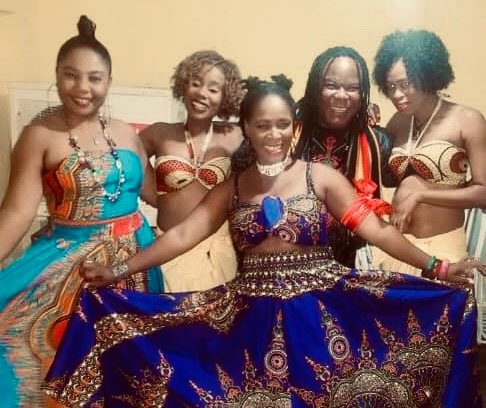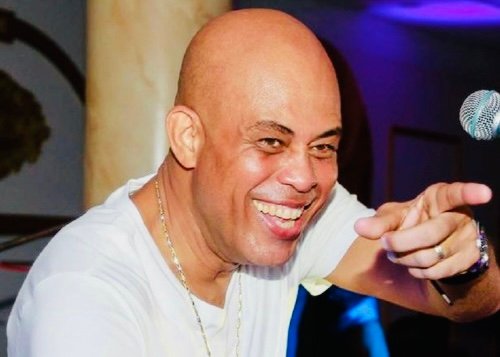A Rock Beginning Turns Into a Roots Awakening
In an interview with HMI Magazine, Pierre Louis Frédéric—known by many as Fredo Kanpech—recalled his early beginnings in music as a rock singer. He initially launched a band called Sunrise, but something felt incomplete. “I felt like something was missing,” he said. That void was filled when he turned toward his cultural roots and transformed the band into Kanpech, embracing Haiti’s powerful rasin (roots) music movement.
From that moment, Kanpech became more than just a band—it became part of a national resistance. Despite being his cousin, Fredo shared that he refused to campaign for the late President Jovenel Moïse. “I was a strong supporter of Moïse Jean-Charles,” he explained, adding that siding with political power wasn’t worth sacrificing his integrity. His decision came at a cost. Fredo stated he faced difficulties securing performances and opportunities due to his political alignment. According to him, Moise Jean-Charles eventually “used him to gain support” and then distanced himself from the band after achieving his goals. It was not all band; even though he did not campaign for the late president Jouvenel Moise, he called and offered him a carnival gig. During the interview, Fredo appears to be very emotional. Things did not have to go as they did for the president; he reported missing his cousin.
Resistance Through Rhythm—and Risk
Fredo’s outspokenness didn’t go unnoticed. During Michel Martelly’s presidency, he claimed his car was shot at while returning home to La Plaine. Although he couldn’t confirm if the attack were politically motivated, he noted it felt “weird and unsettling.” He also reported receiving threatening phone calls due to his vocal opposition to the government. Despite these risks, Fredo insisted that he has always stood with the Haitian people, not politicians.
Kanpech’s political values have always been woven into their music. Whether through Carnival anthems or studio albums, Fredo and the band use their platform to speak truth to power. Now, like many Haitians, he finds himself constantly on the move due to the escalating violence and gang control in Port-au-Prince. “I did all my activism to prevent this,” he said. “But now, greedy politicians have put the country in the worst situation imaginable.”
The Birth of a Roots Powerhouse
In the heart of Haiti’s deep cultural landscape—where rhythm, ritual, and resistance converge—Kanpech emerged as a beacon of tradition and pride. Formed in the early 1990s, the group quickly gained recognition for its fusion of Vodou drumming, rara horns, folkloric chants, and modern instruments. At a time when Haiti was reeling from political chaos and social upheaval, Kanpech became a sonic sanctuary, where the past met the present and the ancestors spoke through the beat of the drum.
But what truly sets Kanpech apart, its unapologetic embrace of Vodou spirituality and cultural identity. Their lyrics—delivered in rich, poetic Kreyòl—tackle themes like oppression, resilience, environmental justice, and national pride. Each performance feels less like a concert and more like a ceremony, awakening the senses and reconnecting audiences to Haiti’s ancestral pulse.
Ambassadors of the Rasin Movement
The Raisin Movement, born in the late 1980s, was a cultural uprising against the Westernization of Haitian music. Bands like Boukman Eksperyans, Boukan Ginen, RAM, Rev, Koudjay, Wawa, and Azor led the charge. Yet, Kanpech distinguished itself by staying grounded in the underground scene—fiercely authentic, deeply spiritual, and passionately communal.
Their music doesn’t chase radio play; it seeks to speak directly to the soul. Kanpech carries the flame of resistance and remembrance through sacred rhythms and rural storytelling. The group is often described not just as musicians, but as cultural warriors—guardians of Haiti’s spirit in times of darkness.
A New Chapter: Kri Sa
In December 2024, Kanpech released its newest album, Kri Sa, a project composed of 10 evocative tracks: “Kri Sa,” “Lakansyel,” “Gade Yo Konplo,” “Konsyans,” “N Ap Woule,” “N’ap Gade,” “Ipokrizi,” “Rasanble,” “Se Pa Lanmou,” “Si’w Vle Ale,” and “Nou Tout Se Yonn Sèl.” Available across all major platforms and social media, the album has been praised by critics. One expert in rasin music called it “refreshing and essential.”
Fredo reflected on the band’s long journey. Starting was far from easy—he turned to legendary Haitian sound engineer Jean Raymond Leconte to help him save money. Fredo collected his savings in a piggy bank to fund a recording session at Audiotek, one of Haiti’s top studios. With five songs recorded, fate intervened. “Daddy” Beaubrun of Boukman Eksperyans heard Fredo’s music and took it to New York, where a producer from a major label was immediately impressed.
This encounter led to a $20,000 record deal with Coconut Groove Label in 1996. Fredo receives $10,000 and negotiates that the entire band, not just himself, be brought to the United States. “The label wanted only me, but I wanted all of Kanpech to be part of the journey,” he said. Thank you to Daddy and Boukan Experyans. That decision marked a historic moment for the band.
Legacy That Echoes
When asked what happened after that milestone, Fredo was reluctant to go into detail, hinting at disappointment and betrayal by close associates and agents. Still, the experience opened global doors. Kanpech performed at prestigious venues in the United States, such as Harvard University, and shared Haiti’s Rasin rhythm with the world.
Today, Kanpech continues to tour, create, and inspire. Their story—filled with spiritual depth, political courage, and artistic brilliance—is a living reminder that Haitian music is more than entertainment; it’s resistance, identity, and a sacred calling.
As the beat of their drums echoes from the mountains of Haiti to stages abroad, Kanpech reminds us that true power lies not in forgetting our roots but in standing proudly within them.
Kanpech Kanpe dwat, and Roots/Rasin Music For Ever




